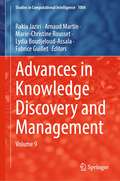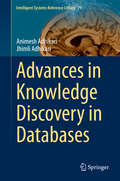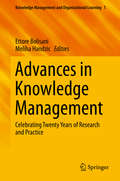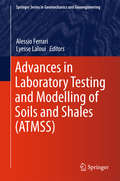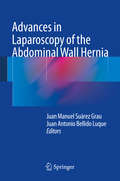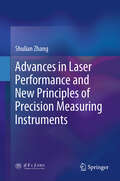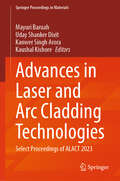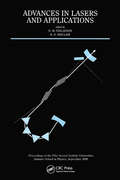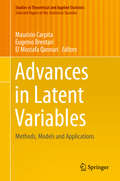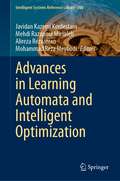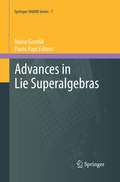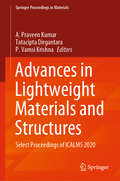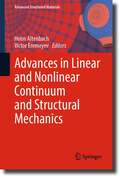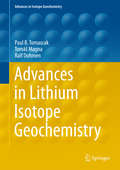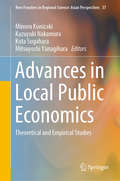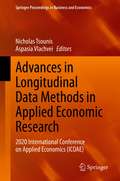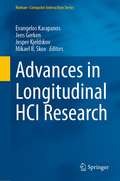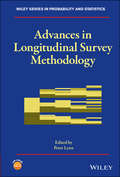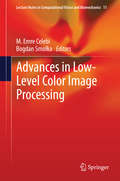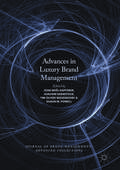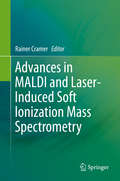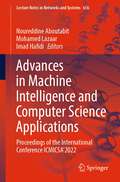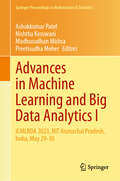- Table View
- List View
Advances in Knowledge Discovery and Management: Volume 9 (Studies in Computational Intelligence #1004)
by Fabrice Guillet Arnaud Martin Rakia Jaziri Marie-Christine Rousset Lydia Boudjeloud-AssalaThis book is a collection of high scientific novel contributions addressing several of these challenges. These articles are extended versions of a selection of the best papers that were initially presented at the French-speaking conferences EGC’2019held in Metz (France, January 21-25, 2019).These extended versions have been accepted after an additional peer-review process among papers already accepted in long format at the conference. Concerning the conference, the long and short papers selection were also the result of a double blind peer review process among the hundreds of papers initially submitted to each edition of the conference (acceptance rate for long papers is about 25%.
Advances in Knowledge Discovery in Databases (Intelligent Systems Reference Library #79)
by Animesh Adhikari Jhimli AdhikariThis book presents recent advances in Knowledge discovery in databases (KDD) with a focus on the areas of market basket database, time-stamped databases and multiple related databases. Various interesting and intelligent algorithms are reported on data mining tasks. A large number of association measures are presented, which play significant roles in decision support applications. This book presents, discusses and contrasts new developments in mining time-stamped data, time-based data analyses, the identification of temporal patterns, the mining of multiple related databases, as well as local patterns analysis.
Advances in Knowledge Management: Celebrating Twenty Years of Research and Practice (Knowledge Management and Organizational Learning #1)
by Ettore Bolisani Meliha HandzicThis book celebrates the past, present and future of knowledge management. It brings a timely review of two decades of the accumulated history of knowledge management. By tracking its origin and conceptual development, this review contributes to the improved understanding of the field and helps to assess the unresolved questions and open issues. For practitioners, the book provides a clear evidence of value of knowledge management. Lessons learnt from implementations in business, government and civil sectors help to appreciate the field and gain useful reference points. The book also provides guidance for future research by drawing together authoritative views from people currently facing and engaging with the challenge of knowledge management, who signal a bright future for the field.
Advances in Laboratory Testing and Modelling of Soils and Shales (Springer Series in Geomechanics and Geoengineering)
by Lyesse Laloui Alessio FerrariIn this spirit, the ATMSS International Workshop "Advances in Laboratory Testing & Modelling of Soils and Shales" (Villars-sur-Ollon, Switzerland; 18-20 January 2017) has been organized to promote the exchange of ideas, experience and state of the art among major experts active in the field of experimental testing and modelling of soils and shales. The Workshop has been organized under the auspices of the Technical Committees TC-101 "Laboratory Testing", TC-106 "Unsaturated Soils" and TC-308 "Energy Geotechnics" of the International Society of Soil Mechanics and Geotechnical Engineering. This volume contains the invited keynote and feature lectures, as well as the papers that have been presented at the Workshop. The topics of the lectures and papers cover a wide range of theoretical and experimental research, including unsaturated behaviour of soils and shales, multiphysical testing of geomaterials, hydro-mechanical behaviour of shales and stiff clays, the geomechanical behaviour of the Opalinus Clay shale, advanced laboratory testing for site characterization and in-situ applications, and soil - structure interactions.
Advances in Laparoscopy of the Abdominal Wall Hernia
by Juan Manuel Suárez Grau Juan Antonio Bellido LuqueAdvances in Laparoscopy of the Abdominal Wall Hernia is fully illustrated, comprehensive guide which describes in detail the most up-to-date techniques used in the laparoscopic repair of hernias. Written by world renowned authors, this manual reviews laparoscopic techniques used in the repair of inguinal hernias and ventral incisional hernias. Among the topics explored within this updated, engaging and informative text are: * Techniques such as Extraperitoneal (TEP) and transabdominal (TAPP) hernia repair * Fundamentals of ventral hernia repair * A detailed overview of mesh fixation in laparoscopic surgery * Methods to deal with rarer hernias and those of atypical location Advances in Laparoscopy of the Abdominal Wall Hernia is a valuable reference tool that would be of great benefit to surgeons and medical practitioners working in this field.
Advances in Laser Performance and New Principles of Precision Measuring Instruments
by Shulian ZhangThis book highlights a comprehensive introduction to double-beam laser and its application to a series of innovative instruments for precision measurement. The first two chapters introduce the structures and properties of double-beam laser, which become the foundation of more than a dozen innovative instruments in the second half of the book. The book covers two types of lasers: the frequency-split orthogonal-polarization HeNe lasers and the microchip solid-state lasers. Surrounding the two types of lasers, the book introduces 13 innovative instruments that can be widely applied to the precision measurement in scientific research, lithography, CNC machine tools, astronautics, and shipbuilding. The book is rich in research data that are all-round and repeatable, which can inspire future research and development of the technology, instruments, as well as application scenarios. The book is used as a valuable reference for researchers, engineers, and students who seek to further bridge laser and precision measurement.
Advances in Laser and Arc Cladding Technologies: Select Proceedings of ALACT 2023 (Springer Proceedings in Materials #81)
by Uday Shanker Dixit Mayuri Baruah Kanwer Singh Arora Kaushal KishoreThis book presents the select proceedings of 1st International Conference on &“Advances in Laser & Arc Cladding Technologies&” (ALACT 23). It highlights the new technologies associated with cladding process for various applications. Various topics covered in this book are laser cladding processing, plasma transferred arc cladding, flux cored arc cladding, MIG and TIG cladding, micro plasma transferred arc and micro laser cladding, high efficiency cladding, high speed laser cladding, claddings for high temperature and other extreme applications, microstructure-property-performance correlations for claddings, mechanical and corrosion properties evaluation of the cladded samples, failure analysis of cladding residual stress, deformation evaluation of cladding, heat treatment of cladded samples, etc. The book is useful for researchers and professionals working in the areas of manufacturing and materials science.
Advances in Lasers and Applications
by D.M. Finlayson B SinclairAdvances in Lasers and Applications opens with tutorial reviews of the underpinning science of diode pumped lasers, optical parametric oscillators, and ultrafast pulse generation. The book proceeds to the more specialized areas of waveguide lasers, ultrafast parametric amplification, visible solid-state lasers, materials, and diode pumps. The final sections present the applications of these sources to medicine, remote sensing and ranging, materials processing, and the widening set of applications for ultrashort pulses.
Advances in Latent Variables: Methods, Models and Applications (Studies in Theoretical and Applied Statistics)
by Maurizio Carpita Eugenio Brentari El Mostafa QannariThe book, belonging to the series "Studies in Theoretical and Applied Statistics- Selected Papers from the Statistical Societies", presents a peer-reviewed selection of contributions on relevant topics organized by the editors on the occasion of the SIS 2013 Statistical Conference "Advances in Latent Variables. Methods, Models and Applications", held at the Department of Economics and Management of the University of Brescia from June 19 to 21, 2013. The focus of the book is on advances in statistical methods for analyses with latent variables. In fact, in recent years, there has been increasing interest in this broad research area from both a theoretical and an applied point of view, as the statistical latent variable approach allows the effective modeling of complex real-life phenomena in a wide range of research fields. A major goal of the volume is to bring together articles written by statisticians from different research fields, which present different approaches and experiences related to the analysis of unobservable variables and the study of the relationships between them.
Advances in Lead-Free Piezoelectric Materials
by Jiagang WuThis book systematically reviews the history of lead-free piezoelectric materials, including the latest research. It also addresses a number of important issues, such as new types of materials prepared in a multitude of sizes, structural and physical properties, and potential applications for high-performance devices.Further, it examines in detail the state of the art in lead-free piezoelectric materials, focusing on the pathways to modify different structures and achieve enhanced physical properties and new functional behavior. Lastly, it discusses the prospects for potential future developments in lead-free piezoelectric materials across disciplines and for multifunctional applications. Given its breadth of coverage, the book offers a comprehensive resource for graduate students, academic researchers, development scientists, materials producers, device designers and applications engineers who are working on or are interested in advanced lead-free piezoelectric materials.
Advances in Learning Automata and Intelligent Optimization
by Alireza Rezvanian Mohammad Reza Meybodi Javidan Kazemi Kordestani Mehdi Razapoor MirsalehThis book is devoted to the leading research in applying learning automaton (LA) and heuristics for solving benchmark and real-world optimization problems. The ever-increasing application of the LA as a promising reinforcement learning technique in artificial intelligence makes it necessary to provide scholars, scientists, and engineers with a practical discussion on LA solutions for optimization. The book starts with a brief introduction to LA models for optimization. Afterward, the research areas related to LA and optimization are addressed as bibliometric network analysis. Then, LA's application in behavior control in evolutionary computation, and memetic models of object migration automata and cellular learning automata for solving NP hard problems are considered. Next, an overview of multi-population methods for DOPs, LA's application in dynamic optimization problems (DOPs), and the function evaluation management in evolutionary multi-population for DOPs are discussed.
Advances in Lie Superalgebras (Springer INdAM Series #7)
by Maria Gorelik Paolo PapiThe volume is the outcome of the conference "Lie superalgebras," which was held at the Istituto Nazionale di Alta Matematica, in 2012. The conference gathered many specialists in the subject, and the talks held provided comprehensive insights into the newest trends in research on Lie superalgebras (and related topics like vertex algebras, representation theory and supergeometry). The book contains contributions of many leading esperts in the field and provides a complete account of the newest trends in research on Lie Superalgebras.
Advances in Light Water Reactor Technologies
by Yuki Ishiwatari Yoshiaki Oka Junichi Yamashita Takehiko SaitoAdvances in Light Water Reactor Technologies focuses on the design and analysis of advanced nuclear power reactors. This volume provides readers with thorough descriptions of the general characteristics of various advanced light water reactors currently being developed worldwide. Safety, design, development and maintenance of these reactors is the main focus, with key technologies like full MOX core design, next-generation digital I&C systems and seismic design and evaluation described at length. This book is ideal for researchers and engineers working in nuclear power that are interested in learning the fundamentals of advanced light water plants.
Advances in Lightweight Materials and Structures: Select Proceedings of ICALMS 2020 (Springer Proceedings in Materials #8)
by P. Vamsi Krishna A. Praveen Kumar Tatacipta DirgantaraThis book presents select proceedings of the International Conference on Advanced Lightweight Materials and Structures (ICALMS) 2020, and discusses the triad of processing, structure, and various properties of lightweight materials. It provides a well-balanced insight into materials science and mechanics of both synthetic and natural composites. The book includes topics such as nano composites for lightweight structures, impact and failure of structures, biomechanics and biomedical engineering, nanotechnology and micro-engineering, tool design and manufacture for producing lightweight components, joining techniques for lightweight structures for similar and dissimilar materials, design for manufacturing, reliability and safety, robotics, automation and control, fatigue and fracture mechanics, and friction stir welding in lightweight sandwich structures. The book also discusses latest research in composite materials and their applications in the field of aerospace, construction, wind energy, automotive, electronics and so on. Given the range of topics covered, this book can be a useful resource for beginners, researchers and professionals interested in the wide ranging applications of lightweight structures.
Advances in Linear and Nonlinear Continuum and Structural Mechanics (Advanced Structured Materials #198)
by Holm Altenbach Victor EremeyevThis book offers a current image of modern mechanics. The book reflects current state of the art in the field of continuum mechanics and mechanics of structures including recent achievements in classic and non-classic approaches. The chapters are written by leading specialist in the field, so the book collects cutting edge investigations in the field. As a target we consider the society starting from beginners, i.e. master and PhD students, and also leaders in the field, that is professors of universities and civil, mechanical and aerospace engineers.
Advances in Lithium Isotope Geochemistry (Advances in Isotope Geochemistry)
by Paul B. Tomascak Tomáš Magna Ralf DohmenThis work summarizes the historical progression of the field of lithium (Li) isotope studies and provides a comprehensive yet succinct overview of the research applications toward which they have been directed. In synthesizing the historical and current research, the volume also suggests prospective future directions of study. Not even a full decade has passed since the publication of a broadly inclusive summary of Li isotope research around the globe (Tomascak, 2004). In this short time, the use of this isotope system in the investigation of geo- and cosmochemical questions has increased dramatically, due, in part, to the advent of new analytical technology at the end of the last millennium. Lithium, as a light element that forms low-charge, moderate-sized ions, manifests a number of chemical properties that make its stable isotope system useful in a wide array of geo- and cosmochemical research fields.
Advances in Local Public Economics: Theoretical And Empirical Studies (New Frontiers in Regional Science: Asian Perspectives #37)
by Mitsuyoshi Yanagihara Minoru Kunizaki Kazuyuki Nakamura Kota SugaharaAdvances in Longitudinal Data Methods in Applied Economic Research: 2020 International Conference on Applied Economics (ICOAE) (Springer Proceedings in Business and Economics)
by Nicholas Tsounis Aspasia VlachveiThis volume presents new methods and applications in longitudinal data estimation methodology in applied economic. Featuring selected papers from the 2020 the International Conference on Applied Economics (ICOAE 2020) held virtually due to the corona virus pandemic, this book examines interdisciplinary topics such as financial economics, international economics, agricultural economics, marketing and management. Country specific case studies are also featured.
Advances in Longitudinal HCI Research (Human–Computer Interaction Series)
by Evangelos Karapanos Jens Gerken Jesper Kjeldskov Mikael B. SkovLongitudinal studies have traditionally been seen as too cumbersome and labor-intensive to be of much use in research on Human-Computer Interaction (HCI). However, recent trends in market, legislation, and the research questions we address, have highlighted the importance of studying prolonged use, while technology itself has made longitudinal research more accessible to researchers across different application domains. Aimed as an educational resource for graduate students and researchers in HCI, this book brings together a collection of chapters, addressing theoretical and methodological considerations, and presenting case studies of longitudinal HCI research. Among others, the authors:discuss the theoretical underpinnings of longitudinal HCI research, such as when a longitudinal study is appropriate, what research questions can be addressed and what challenges are entailed in different longitudinal research designsreflect on methodological challenges in longitudinal data collection and analysis, such as how to maintain participant adherence and data reliability when employing the Experience Sampling Method in longitudinal settings, or how to cope with data collection fatigue and data safety in applications of autoethnography and autobiographical design, which may span from months to several yearspresent a number of case studies covering different topics of longitudinal HCI research, from “slow technology”, to self-tracking, to mid-air haptic feedback, and crowdsourcing.
Advances in Longitudinal Survey Methodology (Wiley Series in Probability and Statistics)
by Peter LynnThis book provides a comprehensive overview of the many advances that have been made in the field of longitudinal survey methodology over the past twelve years, as well as slightly extending the topic coverage of the earlier volume, “Methodology of Longitudinal Surveys.” As such, it describes the state of the art in designing, implementing, and analysing longitudinal surveys. The greatly expanded enthusiasm for longitudinal surveys has brought with it a thirst for knowledge about the best ways to design and implement such surveys. Considerable advances in knowledge have been made in recent years in areas that are covered in this book that encompasses all stages of the design and implementation of longitudinal surveys. Topics include: Dynamic sampling for the representation of dynamic populations; Methods for tracking mobile sample members over time; Methods for maintaining co-operation over time; Targeted design features for response maximisation; The use of longitudinal survey paradata for field management; Advances in dependent interviewing techniques; This book is an invaluable resource providing deeper insight into longitudinal surveys.
Advances in Low-Level Color Image Processing (Lecture Notes in Computational Vision and Biomechanics #11)
by M. Emre Celebi Bogdan SmolkaColor perception plays an important role in object recognition and scene understanding both for humans and intelligent vision systems. Recent advances in digital color imaging and computer hardware technology have led to an explosion in the use of color images in a variety of applications including medical imaging, content-based image retrieval, biometrics, watermarking, digital inpainting, remote sensing, visual quality inspection, among many others. As a result, automated processing and analysis of color images has become an active area of research, to which the large number of publications of the past two decades bears witness. The multivariate nature of color image data presents new challenges for researchers and practitioners as the numerous methods developed for single channel images are often not directly applicable to multichannel ones. The goal of this volume is to summarize the state-of-the-art in the early stages of the color image processing pipeline.
Advances in Luxury Brand Management (Journal of Brand Management: Advanced Collections)
by Jean-Noël Kapferer Joachim Kernstock Shaun M. Powell Tim Oliver BrexendorfPresenting some of the most significant research on the modern understanding of luxury, this edited collection of articles from the Journal of Brand Management explores the complex relationships consumers tie with luxury, and the unique characteristics of luxury brand management. Covering the segmentation of luxury consumers worldwide, the specificity of luxury management, the role of sustainability for luxury brands and major insights from a customer point of view, Advances in Luxury Brand Management is essential reading for upper level students as well as scholars and discerning practitioners.
Advances in MALDI and Laser-Induced Soft Ionization Mass Spectrometry
by Rainer CramerThis book covers the state-of-the-art of modern MALDI (matrix-assisted laser desorption/ionization) and its applications. New applications and improvements in the MALDI field such as biotyping, clinical diagnosis, forensic imaging, and ESI-like ion production are covered in detail. Additional topics include MS imaging, biotyping/speciation and large-scale, high-speed MS sample profiling, new methods based on MALDI or MALDI-like sample preparations, and the advantages of ESI to MALDI MS analysis. This is an ideal book for graduate students and researchers in the field of bioanalytical sciences. This book also: * Showcases new techniques and applications in MALDI MS * Demonstrates how MALDI is preferable to ESI (electrospray ionization) * Illustrates the pros and cons associated with biomarker discovery studies in clinical proteomics and the various application areas, such as cancer proteomics
Advances in Machine Intelligence and Computer Science Applications: Proceedings of the International Conference ICMICSA’2022 (Lecture Notes in Networks and Systems #656)
by Mohamed Lazaar Noureddine Aboutabit Imad HafidiThis book encloses latest and advanced researches on artificial intelligence and its applications in computer science. It is an interesting book that aims to help students, researchers, industrialists, and policymakers understand, promote, and synthesize innovative solutions and think of new ideas with the application of artificial intelligence concepts. It also allows to know the existing scientific works and contributions in the literature. This book identifies original research in new directions and advances focused on multidisciplinary areas and closely related to the use of artificial intelligence in applications of computer science, communication, and technology. The present book contains selected and extended high-quality papers of the 1st international conference on Machine Intelligence and Computer Science Applications (ICMICSA’2022). It is the result of a reviewed, evaluated, and presented work in ICMICSA’2022 held on November 28–29, 2022, in Khouribga, Morocco.
Advances in Machine Learning and Big Data Analytics I: ICMLBDA 2023, NIT Arunachal Pradesh, India, May 29-30 (Springer Proceedings in Mathematics & Statistics #441)
by Preetisudha Meher Nishtha Kesswani Madhusudhan Mishra Ashokkumar PatelThis edited volume on machine learning and big data analytics (Proceedings of ICMLBDA 2023, that was held on May 29-30, 2023 by NERIST and NIT Arunachal Pradesh India) is intended to be used as a reference book for researchers and professionals to share their research and reports of new technologies and applications in Machine Learning and Big Data Analytics like biometric Recognition Systems, medical diagnosis, industries, telecommunications, AI Petri Nets Model-Based Diagnosis, gaming, stock trading, Intelligent Aerospace Systems, robot control, law, remote sensing and scientific discovery agents and multiagent systems; and natural language and Web intelligence. The intent of this book is to provide awareness of algorithms used for machine learning and big data in the advanced Scientific Technologies, provide a correlation of multidisciplinary areas and become a point of great interest for Data Scientists, systems architects, developers, new researchers and graduate level students. This volume provides cutting-edge research from around the globe on this field. Current status, trends, future directions, opportunities, etc. are discussed, making it friendly for beginners and young researchers.
